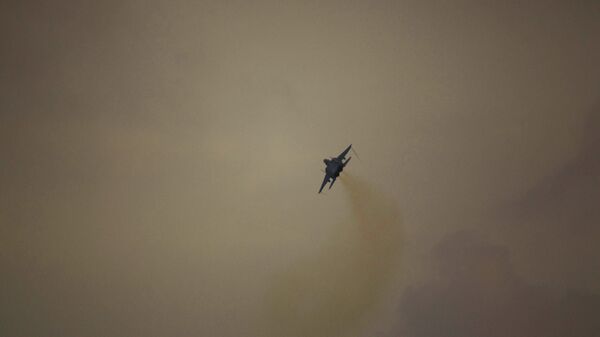Sputnik: In your view how can the increasing tension on Israel’s northern border impact Israel-Syria relations?
Mona Alami: We're seeing clearly Israeli strikes on Syria. Israel, by its own admission, has targeted Syria over one hundred times, as we've seen in one of the last strikes, on September 7, there were also reports of Israeli jets bombing facilities in the north-west of the country believed to be associated with President Bashar al-Assad's chemical weapons program. So definitely the Israelis are upping the ante in terms of its security in terms of Syria. We've seen a visit by Israeli Prime Minister Benjamin Netanyahu to the occupied Golan Heights. Israel has clearly stated that it does not see well any encroachment of Iran in terms of the southern border of Syria and it considers it as a direct threat to its security. At the end of January we've also seen the visit of possibly the next Iranian Supreme leader, Ebrahim Raisi, who visited Syria and Lebanon and who was also seen on the border of Israel with Lebanon.
READ MORE: Syrian Air Defenses Respond to Israeli 'Aggression' Near Damascus — State Media
Sputnik: Some are saying that these Israeli strikes are thought to be aimed at preventing transfers of advanced weapons to the Lebanese Hezbollah movement, can you comment on that?
Mona Alami: From my sources within Hezbollah, I'm hearing that a lot of weapons are being smuggled from Syria to Hezbollah. As you may know, Iran and Syria share common research facilities when it comes to weapons, and it seems that these facilities have also the input of North Korea. Hezbollah in recent events, in 2006 and the last war with Israel, has been able to deploy or develop surface-to-surface missiles with precision heads and it's been able to modify the distance that missiles can fly or the ammunition that they can carry.
Sputnik: So Israel is saying the attacks are aimed at Hezbollah, it views of course Hezbollah as a terrorist organization, Syria is not happy with Israel's strikes because in Syria's opinion they violate Syria's sovereignty, what is your take on the matter?
Mona Alami: Yes, definitely Israel is violating the sovereignty of both Lebanon and Syria. You may have heard of the accusations that are being traded between Lebanon and Israel, there's a disagreement about the maritime borders, we're seeing Israel striking Syria from Lebanon's airspace, we're seeing Israel announcing reconnaissance mission over southern Lebanon, so definitely Israel is respecting neither Syrian nor Lebanese sovereignty.
![]() Sputnik: Syria has filed a complaint with the UN against Israel's aggressive attitude, against the violation of their sovereignty, what do you think the response will be from the international community?
Sputnik: Syria has filed a complaint with the UN against Israel's aggressive attitude, against the violation of their sovereignty, what do you think the response will be from the international community?
Mona Alami: If you look at the history of Syria filing complaints within the United Nations, we've seen dozens of complaints filed in the UN against Israel's aggressive attitude mostly in 2014 and 2017. There's always condemnation by the international community but nothing is done. Even if a resolution would be proposed within the UN, generally the United States always stands by Israel and blocks, vetoes any resolution against Israel's behavior [in the Security Council].
Sputnik: It seems like a very difficult situation on the ground in Syria right now, what is this all going to lead to and how do these various countries with various interests going to coexist on this war front?
Mona Alami: I think that since September, since the summer even, we've seen a lot of declarations by various regional powers talking about sending aid to the Syrian opposition. So I think that since September-October we've seen a change, a modification of the war in Syria with maybe the end of the real war between the Syrian regime, which has captured much of the country, and the opposition which appears to be have been sold out by its backers. We're seeing a change in this war and the regionalization of the conflict. Before we used to see Syrian opposition backed by regional powers fighting Assad and now we're seeing direct regional involvement whether from the Americans in northern Syria or more recently from Turkey in the Afrin region. I think this is very dangerous because we're seeing different regional powers with different agendas that are confronted on Syrian soil. It's very difficult to asses the situation, I can say that definitely Turkish aggression in Syria, especially that is backed by the opposition is very dangerous because not only are we seeing a direct intervention of regional power but we're also seeing an ethnic component which is pitting Arabs against Kurds and this could spur out of control.
Sputnik: Obviously there's a fragmented opposition that remains and what exactly is the state of that, to what extent is that a danger?
Mona Alami: Yes, there's definitely fighting taking place in Idlib, we've seen also in [eastern] Ghouta, I think that the opposition is practically finished because it has lost the support of its regional backer.
READ MORE: Netanyahu Says Israel Won't Allow Iran to 'Entrench Itself Militarily' in Syria
Sputnik: So some of the opposition has signed a peace accord with the Syrian government?
Mona Alami: Yes, now the de-escalation process isn't really applied, but when you look at the de-escalation a lot of work has been done in Zabadani, in southern Syria on peace agreements with the opposition and we've seen the integration of opposition leaders in southern Syria to militia that are pro-regime. So I think that the militias that are now pro-regime have a variety of backup and are backed by different fractions.
The views expressed in this article by Mona Alami are solely those of the speaker and do not necessarily reflect the position of Sputnik.


